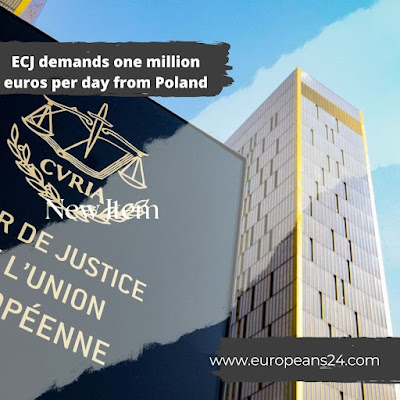Brussels is hoping to reach an agreement with the PiS administration.
Brussels is hoping to reach an agreement with the PiS administration. Because the EU lacks bailiffs, but there are compelling reasons to reach an agreement.
Progressives were overjoyed far too soon. Poland has been fined one million euros per day by the European Court of Justice (ECJ) until the PiS government abolishes the judicial disciplinary body. The existence and operation of the ECJ had been labeled as illegitimate and a threat to the independence of the court by the European Court of Justice.
The EU is serious; it has right-wing populists by the collar, and the rhetoric of money withdrawal will compel them to comply: That was roughly the tenor of the cheering in the European Parliament’s left-of-center spectrum (EP). It appears that they have not yet learnt the lessons of the ten-day fight with Prime Minister Mateusz Morawiecki in the EP and the EU summit a week ago.
Certainly, anyone who wants to be outraged may now do so: if the EU cannot police its ideals and the ECJ cannot enforce its decisions, they are nothing more than paper tigers. The argument on European law’s importance thus appears to be a smear farce.
However, it is ineffective. Such is the true power balance. There are no bailiffs in the EU who collect penalties from member states. All that remains for Brussels to do is subtract the penalty from the cash that Poland will get from various EU funds. On the other hand, this may persuade Poland to refuse to pay its membership dues.
Von der Leyen wants to disburse cash for Poland on a conditional basis
This problem will be settled by a political agreement, no matter which way you look at it. Ursula von der Leyen, the President of the Commission, has already detailed it. Warsaw will release a portion of the rebuilding fund financing if it guarantees that the disciplinary body will be disbanded, that the judges who were fired by it will be reinstated, and that Polish judges will not be barred from sending cases to the ECJ. The rest should go smoothly if Warsaw has made the necessary announcements.
This willingness to compromise on the Commission’s behalf enraged the EP’s left of center. However, there is nothing that can be done to stop them. They have created unreasonable expectations, and they must accept responsibility for their own failure.
For two reasons, the EU cannot allow itself to be harsh with Poland. She is interested in a Poland that works together. The pressure on the EU’s external border is only one example among many. Belarus’ ruler, Aleksander Lukashenko, acts as a human smuggler in order to undermine the European Union. In the European Parliament, MEPs from the bourgeois and conservative parties commended Morawiecki for securing Poland’s external border.
The EU Commission and the European Council of Heads of Government, in contrast to the progressives in the EP, are typically not interested in intensifying the issue with Poland. They don’t want to take the chance of Warsaw vetoing EU decisions.
There’s also Polish internal politics and European interests to consider. If the PiS loses the next election and pro-European forces take power, the crisis with Poland will be resolved quickly. The PiS thinks that presenting itself as a victim of unfair and overbearing Brussels intrusion will garner them votes.
The PiS’s involuntary election workers are the Greens and Social Democrats
The Greens and Social Democrats should not participate in the EP as PiS’s involuntary election workers. And he’s not much of a supporter of the PiS’s ultra-populist elements. The long-term successor to party leader Jaroslaw Kaczynski is embroiled in a power struggle.
Prime Minister Morawiecki represents the government’s moderate elements. With him, you can have a conversation. On the other side, Justice Minister Zbigniew Ziobro believes that escalating tensions with the EU will benefit him domestically. Strengthening Ziobro against Morawiecki is also not in Europe’s best interests.
Overall, if von der Leyen can resolve the disagreement through compromise, it will be better for the EU’s capacity to act. As a result, Warsaw will most likely avoid paying the sanctions associated with the disciplinary body’s delayed dissolution.
The author Christoph von Marschall is a German journalist.








+ There are no comments
Add yours